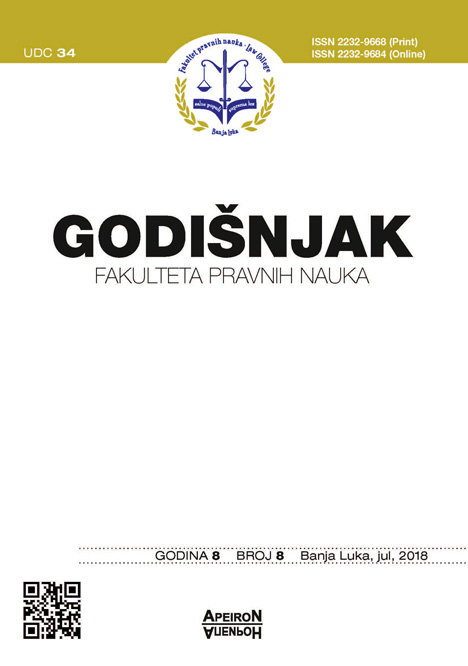Constitutional Aspect of the Application of EU Standards on the Use of Electronic Signature in the Republic of Srpska // Ustavnopravni aspekt primjene EU standarda o upotrebi elektronskog potpisa u Republici Srpskoj
DOI:
https://doi.org/10.7251/GFP1808125MAbstract
The Constitution of Bosnia and Herzegovina defines the right for free economy, which is the basis of economic development through the promotion of private ownership and the development of market economy. Every citizen have freedom of movement within and outside of Bosnia and Herzegovina, as well as the freedom to choose a place of life, free choice of work and creating a business through positive competition between business entities.
Bosnia and Herzegovina has assumed the obligations of integrating international legislation into its legal system. In order to implement the constitutional right for freedom of movement of people and capital, Bosnia and Herzegovina is obliged to apply international standards and regulations in the field of identification documents. At the same time, Bosnia and Herzegovina is integrated in the regional market with neighboring countries, the continental market in Europe and the intercontinental global marketplace. Such integration requires the creation of conditions in Bosnia and Herzegovina for the development of a business environment that is at least the same or better in relation to other markets.
A constitutional obligation of all levels of government of Bosnia and Herzegovina is to remove all barriers that slow down or disrupt business, in order to enable that goods and services that are created by economic entities in Bosnia and Herzegovina can be competitive. In the era of Internet and digital business development, products and services can and must be available in every corner of the planet, and each state must create constitutional legal requirements that guarantee the rapid and free movement of goods and equity under equal conditions. This constitutional obligation guarantees that citizens without discrimination have at least equal conditions for business as well as individuals in other countries and in other markets with which goods and services are exchanged.
In Bosnia and Herzegovina, there is a legal and legitimate framework for the use of a digital signature. However, in practice, this way of legally valid business did not become a reality. In the business environment in Bosnia and Herzegovina and Republic of Srpska is not possible to sign contracts electronically, to report taxes and contributions legally certified by digital signatures or digitally archive business documents or to open a business electronically.
The question arises as to the objective reasons for this situation, as well as the constitutional and legal framework and practice in order to bring the citizens of Bosnia and Herzegovina and the Republic of Srpska into equal status with citizens in the open capital market.
